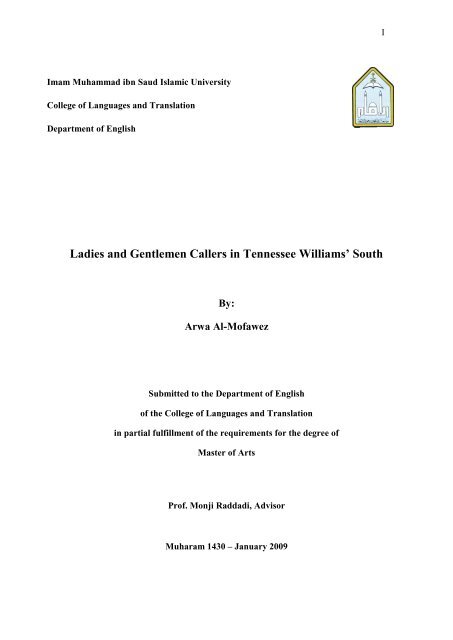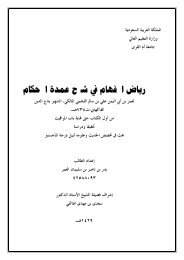Ladies and Gentlemen Callers in Tennessee Williams' South
Ladies and Gentlemen Callers in Tennessee Williams' South
Ladies and Gentlemen Callers in Tennessee Williams' South
Create successful ePaper yourself
Turn your PDF publications into a flip-book with our unique Google optimized e-Paper software.
Imam Muhammad ibn Saud Islamic University<br />
College of Languages <strong>and</strong> Translation<br />
Department of English<br />
<strong>Ladies</strong> <strong>and</strong> <strong>Gentlemen</strong> <strong>Callers</strong> <strong>in</strong> <strong>Tennessee</strong> Williams’ <strong>South</strong><br />
By:<br />
Arwa Al-Mofawez<br />
Submitted to the Department of English<br />
of the College of Languages <strong>and</strong> Translation<br />
<strong>in</strong> partial fulfillment of the requirements for the degree of<br />
Master of Arts<br />
Prof. Monji Raddadi, Advisor<br />
Muharam 1430 – January 2009<br />
I
Abstract<br />
Blanche Dubois <strong>and</strong> Am<strong>and</strong>a W<strong>in</strong>gfield <strong>in</strong> <strong>Tennessee</strong> <strong>Williams'</strong> plays A Streetcar<br />
Named Desire <strong>and</strong> The Glass Menagerie, are two female ambassadors from the vanished<br />
plantation of the Old <strong>South</strong>. Their journey of f<strong>in</strong>d<strong>in</strong>g gentlemen callers becomes a symbol of<br />
a lost life mode, which is lamentable but unavoidable. It also reflects a shape of community<br />
where women cannot def<strong>in</strong>e themselves except through the existence of men <strong>in</strong> their lives. In<br />
Am<strong>and</strong>a <strong>and</strong> Blanche, Williams evocatively portrays the harsh <strong>and</strong> terrify<strong>in</strong>g lonel<strong>in</strong>ess of<br />
fem<strong>in</strong><strong>in</strong>e <strong>in</strong>dividuals <strong>in</strong> the isolation of the New <strong>South</strong>. He shows their pitiable <strong>and</strong> deep<br />
attempt to cl<strong>in</strong>g to values momentous to them <strong>in</strong> the face of an aggressive, male-dom<strong>in</strong>ated<br />
society. Williams demonstrates their tragic struggle to establish contact with the world<br />
through f<strong>in</strong>d<strong>in</strong>g a gentleman caller who represents the attributes of the Old <strong>South</strong>. The<br />
playwright shows that they failed because of their <strong>in</strong>ability to fulfill an impossible dream.<br />
III
Table of contents<br />
Introduction 1<br />
I. The Glass Menagerie: A Determ<strong>in</strong>ed Quest of the Long<br />
Awaited Gentleman Caller 3<br />
II. A Streetcar Named Desire: The Disappo<strong>in</strong>t<strong>in</strong>g, Imag<strong>in</strong>ative<br />
<strong>and</strong> Substitute <strong>Gentlemen</strong> <strong>Callers</strong> 20<br />
Works Cited 46<br />
VI
Introduction<br />
Al-Mofawez 1<br />
Historically, the ideal of the <strong>South</strong>ern Lady lies at the very core of the traditions <strong>and</strong> the<br />
values of the American <strong>South</strong>. The image of the lady <strong>and</strong> her devotion to the stern convention of the<br />
conduct, dignity, decency, <strong>and</strong> chastity have resulted <strong>in</strong> the <strong>South</strong>ern male plac<strong>in</strong>g her upon a pl<strong>in</strong>th<br />
from which she f<strong>in</strong>ds it hard to descend. The <strong>South</strong>ern lady is a female <strong>in</strong> wait<strong>in</strong>g, with traits<br />
specifically designed to enable her to capture a wealthy, thriv<strong>in</strong>g man.<br />
Am<strong>and</strong>a W<strong>in</strong>gfield <strong>and</strong> Blanche Dubois, the two most famous <strong>South</strong>ern Gentlewomen<br />
among Williams‘ characters share a loyal sentiment to their Old <strong>South</strong>, a sentiment that makes<br />
adjustment to their displacement from their former <strong>South</strong>ern background hard to achieve. These<br />
characters attempt to cope with the actuality of their new environment through reflections of the<br />
<strong>South</strong>ern majesty <strong>and</strong> fantasies of the long-awaited gentleman caller. But, unable to cope with the<br />
changed circumstances, these women struggle to survive a cruel <strong>and</strong> disgraceful existence, void of<br />
<strong>South</strong>ern dignity, through fantasy <strong>and</strong> illusion.<br />
Williams‘ sensitive females unconsciously feel that the loads of the modern society have<br />
caused a moral <strong>and</strong> spiritual transformation. They feel that they are out of place, deeply distressed,<br />
<strong>and</strong> totally disoriented. Williams captures his female characters <strong>in</strong> moments when their ―personal<br />
dreams <strong>and</strong> myths are under pressure <strong>and</strong> when the reality of mortality <strong>and</strong> the fact of the physical<br />
decl<strong>in</strong>e become undeniable‖(Bigsby, A Critical Introduction 17). As a result, they become anxious<br />
<strong>and</strong> <strong>in</strong> desperate need to take refuge <strong>in</strong> former memories. Be<strong>in</strong>g unable to adjust or to reshape their<br />
identity accord<strong>in</strong>g to the new st<strong>and</strong>ards, they sense that the community rejects them for be<strong>in</strong>g too<br />
old-fashioned or for simply be<strong>in</strong>g too old.<br />
At first sight, Am<strong>and</strong>a W<strong>in</strong>gfield, <strong>and</strong> Blanche DuBois, both believe <strong>in</strong> the romantic ―myth<br />
of the Old <strong>South</strong> of gracious liv<strong>in</strong>g, family tradition, chivalry <strong>and</strong> coquetry‖(Bauer-Briski 23). Both
Al-Mofawez 2<br />
are evenly shocked by the animalistic expression of the <strong>in</strong>st<strong>in</strong>cts <strong>and</strong> want the f<strong>in</strong>er th<strong>in</strong>gs <strong>in</strong> life<br />
<strong>in</strong>stead. They are wrong <strong>in</strong> assum<strong>in</strong>g that the image of the <strong>South</strong>ern Gentlewoman as an icon of<br />
<strong>South</strong>ern culture is their pathway to success. While Blanche, who has ―the manner of a genteel<br />
aristocrat <strong>and</strong> the habits of a prostitute‖(Hirsch 28), fails to correlate with that pure <strong>in</strong>carnation,<br />
Am<strong>and</strong>a is not enclosed by these physical contradictions but she fails also to represent the true<br />
dignified embodiment of the <strong>South</strong>ern Gentlewoman.<br />
Am<strong>and</strong>a <strong>and</strong> Blanche hold tightly to the <strong>South</strong>ern gender role which states that the<br />
female‘s foremost def<strong>in</strong>ition lies <strong>in</strong> her ability to ―enterta<strong>in</strong> the gentleman‖(Streetcar 101). This<br />
demonstrates quite well that, as far as the female is concerned, ―the role offered by the Old <strong>South</strong><br />
was social <strong>and</strong> symbolic <strong>and</strong> not personal <strong>and</strong> physical. The woman was essentially a passive<br />
creature, alternately a chaste symbol, a social icon who played her role <strong>in</strong> conceal<strong>in</strong>g a more<br />
anarchic <strong>and</strong> brutal reality‖(Bigsby, A Critical Introduction 63). The image of the <strong>South</strong>ern<br />
Gentlewoman as a conventional ideal not only is the symbol for Am<strong>and</strong>a <strong>and</strong> Blanche‘s descend<strong>in</strong>g<br />
but also imply the rigid gender stereotypes <strong>in</strong> the <strong>South</strong>ern background.<br />
For the two characters, it is the gentleman caller who could be the bridge to the return to<br />
gentility <strong>and</strong> prosperity. <strong>Tennessee</strong> Williams def<strong>in</strong>es his gentleman caller as "the long-delayed but<br />
always expected someth<strong>in</strong>g that we live for"(Menagerie 1). However, these women refuse to see the<br />
gentleman caller as a l<strong>in</strong>k to the real world. They <strong>in</strong>sist on attach<strong>in</strong>g him with all the long forgotten<br />
qualities <strong>and</strong> graces they associate with the word "gentility".<br />
Am<strong>and</strong>a's failure with the gentleman caller occurs from the fact that she is ensnared <strong>in</strong> her<br />
perception of what life should be as opposed to what it is. Blanche DuBois' perception of the<br />
gentleman caller takes her one step further. Her gentleman caller viciously focuses the light of reality<br />
on her face <strong>and</strong> pushes her toward creat<strong>in</strong>g an imag<strong>in</strong>ative suitor <strong>and</strong> then reaches <strong>in</strong>sanity. The<br />
symbol of the gentleman caller is so important <strong>in</strong> the scheme of The Glass Menagerie that Williams<br />
first entitled the screen version "The Gentleman Caller". Only after revis<strong>in</strong>g it to stage form did he
Al-Mofawez 3<br />
change the title to The Glass Menagerie (Johns 325). This early title underscores <strong>Williams'</strong> essential<br />
premise that reality <strong>and</strong> illusion are forever rooted <strong>in</strong> the m<strong>in</strong>d of the displaced female. While much<br />
attention has been paid to the females' cl<strong>in</strong>g<strong>in</strong>g to their <strong>South</strong>ern past <strong>in</strong> <strong>Tennessee</strong> <strong>Williams'</strong> plays,<br />
there is no real focus <strong>in</strong> A Streetcar Named Desire on the concept of the gentleman caller as a symbol<br />
of the female's severe displacement.<br />
In The Glass Menagerie <strong>and</strong> A Streetcar Named Desire, Williams seems to be present<strong>in</strong>g the<br />
frustration of the females‘ dislocation <strong>in</strong> place <strong>and</strong> time. Blanche <strong>and</strong> Am<strong>and</strong>a‘s conflict <strong>in</strong> the<br />
manner of their nostalgic yearn<strong>in</strong>g for a ―gentleman", is a struggle with a socio-economic structure.<br />
Their crav<strong>in</strong>g to f<strong>in</strong>d this figure is self-defeat<strong>in</strong>g because they do not recognize that their own<br />
dis<strong>in</strong>tegrated <strong>and</strong> basically socially constructed ideals are prevent<strong>in</strong>g them to form self-realization.<br />
They can not manage to show that their desperate search for the gentleman caller to ensure protection<br />
is not a way-out to f<strong>in</strong>d their ideals or to fulfill their fem<strong>in</strong><strong>in</strong>e needs, but only a desperate seek to<br />
recapture a way of a collapsed life. The women's constant reference to their solid <strong>South</strong>ern roots<br />
amplifies the destructive mascul<strong>in</strong>e system, <strong>and</strong> consequently pushes them deeper <strong>in</strong>to an <strong>in</strong>flated<br />
illusion.<br />
The quest for the real representative of the gentleman caller with all the <strong>South</strong>ern attributes<br />
demonstrates a woman <strong>and</strong> a culture <strong>in</strong> a state of crisis. In seek<strong>in</strong>g this figure, both Am<strong>and</strong>a <strong>in</strong> The<br />
Glass Menagerie <strong>and</strong> Blanche <strong>in</strong> A Streetcar Named Desire do not only reflect an <strong>in</strong>dividual<br />
fem<strong>in</strong><strong>in</strong>e subject but also a symbol of ―an entire past life or [for] the expir<strong>in</strong>g culture with which the<br />
subject <strong>in</strong> question is associated‖ (Savran 22).<br />
I. The Glass Menagerie: A Determ<strong>in</strong>ed Quest of the Long Awaited Gentleman Caller:<br />
In her upbr<strong>in</strong>g<strong>in</strong>g <strong>in</strong> Blue Mounta<strong>in</strong> as a <strong>South</strong>ern lady, Am<strong>and</strong>a W<strong>in</strong>gfield is prepared to<br />
undertake the traditional responsibilities of the enterta<strong>in</strong><strong>in</strong>g wife. This k<strong>in</strong>d of lady is totally<br />
dependent on her husb<strong>and</strong> to fulfill the needs of the family. She is hang<strong>in</strong>g on her <strong>South</strong>ern



![[1] C.D . Green, Integral Equations Methods, Thomas Nelson ...](https://img.yumpu.com/51398122/1/184x260/1-cd-green-integral-equations-methods-thomas-nelson-.jpg?quality=85)












